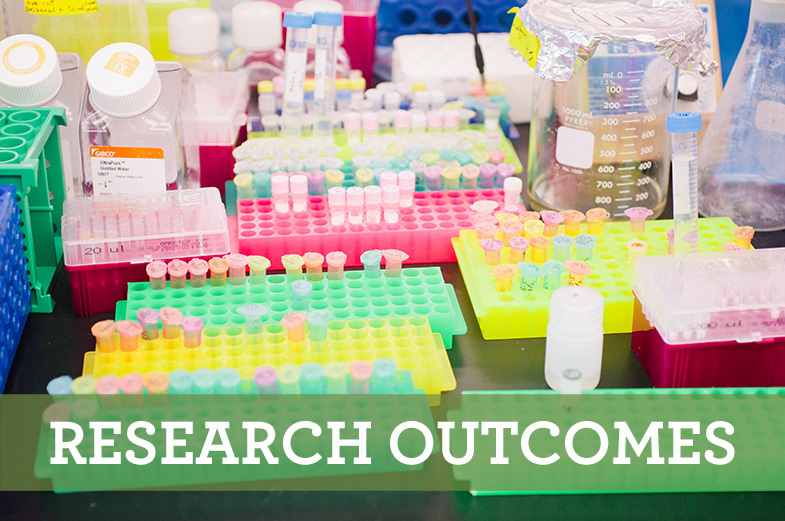This quarterly edition of the St. Baldrick’s Foundation Research Outcomes features research made possible by you to reduce late effects, improve survival for relapsed T-ALL, increase NK (natural killer) cells levels in cancer patients, and share valuable data.
Thank you for making research possible.

Impact of Anesthesia Exposure in Childhood Cancer Patients
Many children with cancer develop learning problems after treatment. Researchers don’t yet know how best to predict which children will have problems, making it hard to prevent them from occurring. Outcomes recently presented at the American Society of Hematology (ASH) meeting are providing some hope.
St. Baldrick’s Researcher Dr. Kristina Hardy and colleagues found that children who received more of a certain kind of anesthesia, called propofol, had more problems with thinking and learning after their cancer treatment ended. Importantly, however, and unlike other known risk factors for cognitive late effects in these patients, anesthesia exposure is modifiable. The future steps are to examine interventions that can reduce the need for anesthesia exposure in these patients.
Promising Treatment Option for Relapsed T-ALL
Children with T-cell leukemia (T-ALL) who experience relapse have a low chance of a cure with current therapy. St. Baldrick’s Fellow Dr. Ryan Summers is hard at work to change this. MERTK and BCL-2 are proteins that may be therapeutic targets in children with T-ALL. Dr. Summers tested whether treatments targeting these proteins are effective in experimental models of T-ALL. As published in Cancers, he found that a new drug called MRX-2843, which blocks MERTK function, can kill T-ALL cells. In T-ALL models, treatment with this new drug reduced the presence of leukemia cells and prolonged survival.
When combined with another drug called venetoclax, which blocks BCL-2 function, it proved more effective. These studies provide good evidence that MRX-2843 could be effective for treatment of T-ALL, especially when combined with venetoclax.
This grant was supported by the Emily Beazley Kures for Kids Fund, a St. Baldrick’s Hero Fund.
Growing NK cells for Neuroblastoma Patients
Natural Killer (NK) cells are an important part of your immune system that can recognize cancer and work in concert with other cancer treatments, but they are low in number and function in cancer patients. These cells are particularly good at killing neuroblastoma. Dr. Dean Lee has been working to grow NK cells outside the body from neuroblastoma patients. With St. Baldrick’s funding he and his colleagues at NANT (New Approaches to Neuroblastoma Therapy) conducted a multi-institutional clinical trial to test if it was safe and feasible to grow these cells and restore their function, ship them back to participating institutions, and give them back to the patient in large numbers.
The outcomes were encouraging and showed it was safe. However, because the number of NK cells in cancer patients are so small, it was difficult to achieve the highest dose levels. But Dr. Lee isn’t letting that stop him. He has designed a follow-on trial to test “ready-to-use” NK cells that are grown from healthy donors.
Sharing Data to Improve Pediatric Cancer Treatment
Did you hear? The White House Office of Science and Technology Policy just announced a series of new actions to advance open and equitable research, including designating 2023 as the Year of Open Science!
The Pediatric Cancer Data Commons (PCDC) houses the world’s largest set of harmonized clinical data for pediatric cancer research. With hundreds of international collaborators forming more than ten disease-specific consortia, they have collected and harmonized data from across more than forty countries and almost all types of pediatric cancer, and continue to grow. This massive international collaboration creates larger datasets with better genetic and geographical diversity within the available data.
The recent launch of the PCDC Data Portal allows researchers easy access to this diverse data. The St. Baldrick’s Foundation has proudly provided essential support for the development and launch of the PCDC data portal and analysis tools.
The researchers who have already made their data available for research are driving new science and publishing their discoveries. At least 68 papers have been published using data from the PCDC or consensus opinions developed by the consortium experts. With ongoing funding from St. Baldrick’s, we are excited to see what the future brings for this data commons. Read the PCDC Annual Report for more details.
Not every publication of research supported by St. Baldrick’s makes the news, but each one adds to the body of scientific knowledge that takes us one step closer to better outcomes for kids with cancer. Your continued support will make more research possible to Conquer Kids’ Cancer.
Donate now and help support research into better treatments for kids with cancer.
Read more on the St. Baldrick’s blog:

 SBF
Tweets »
SBF
Tweets »